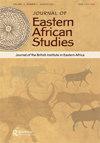威权微观政治:乌干达NRM村主席及其2018年连任的教训
IF 0.6
3区 社会学
Q2 AREA STUDIES
引用次数: 1
摘要
2018年7月,乌干达近二十年来首次举行公开选举,争夺村主席(地方议会1/LC1)的职位。这些办事处是全国抵抗运动(NRM)执政初期著名的权力下放项目的核心,在大多数乌干达人的日常生活中仍然具有巨大的意义。虽然他们期待已久的连任本身就提供了一个值得研究的焦点,但本文利用这个机会来检验一组更广泛的关于NRM下村主席演变的说法,以及他们暴露于竞争政治的变化如何适应1986年以来更广泛的政权巩固战略。基于2015年至2017年间进行的人种学研究,本文将认为,由于地方议会在2018年之前很长一段时间没有选举,因此在大多数公民眼中,地方议会不应该被认为是“非法的”,而且在许多重要方面,他们与更高级别的地方政治职位有很大不同。相反,它配置了他们在更广泛的主导政党体系中的地位,他们在维持这一体系中的主要作用既是象征性的,也是结构性的。本文章由计算机程序翻译,如有差异,请以英文原文为准。
Authoritarian micro-politics: village chairpersons in NRM Uganda and the lessons of their 2018 re-election
ABSTRACT In July 2018, the office of village chairperson (Local Council 1/LC1) was contested throughout Uganda in open elections for the first time in almost two decades. These offices, central to the National Resistance Movement’s (NRM) famed decentralisation project in its early years in power, continue to have immense significance in the daily lives of most Ugandans. While their long-awaited re-election provides a worthy focus of study in its own right, this article uses the occasion to test a broader set of claims about the evolution of village chairpersons under the NRM, and how variations in their exposure to competitive politics fits into a broader strategy of regime consolidation since 1986. Based on ethnographic research conducted between 2015 and 2017, the article will argue that LC1s should not necessarily be considered ‘illegitimate’ in the eyes of most citizens due to their long period without election before 2018, and that in many important respects they differ significantly from higher levels of local political office. Instead, it configures their place in the broader dominant party system, their main role in the maintenance of which is as symbolic as it is structural.
求助全文
通过发布文献求助,成功后即可免费获取论文全文。
去求助
来源期刊

Journal of Eastern African Studies
AREA STUDIES-
CiteScore
3.30
自引率
7.10%
发文量
12
期刊介绍:
Journal of Eastern African Studies is an international publication of the British Institute in Eastern Africa, published four times each year. It aims to promote fresh scholarly enquiry on the region from within the humanities and the social sciences, and to encourage work that communicates across disciplinary boundaries. It seeks to foster inter-disciplinary analysis, strong comparative perspectives, and research employing the most significant theoretical or methodological approaches for the region.
 求助内容:
求助内容: 应助结果提醒方式:
应助结果提醒方式:


